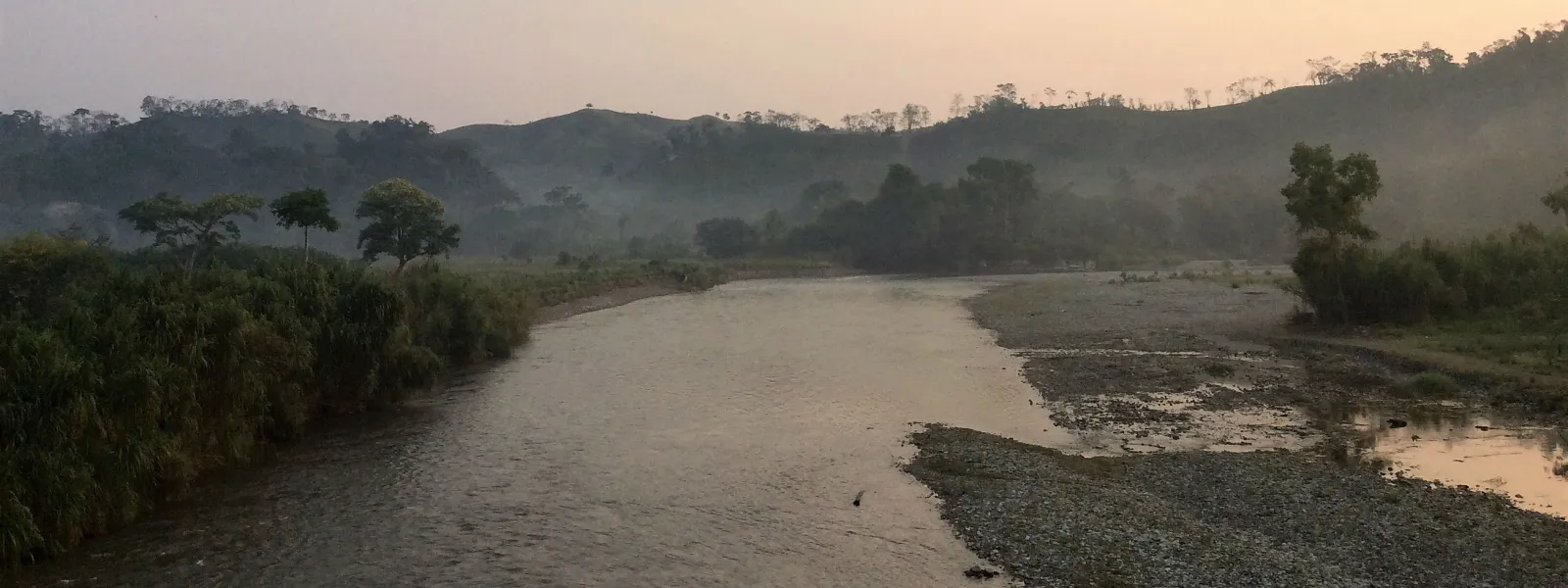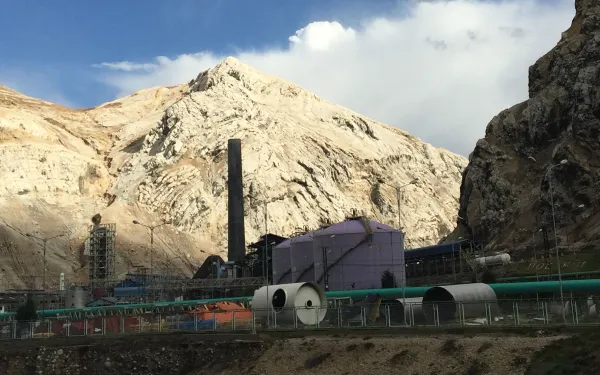
Project
Liliana Ávila /AIDAMayan women’s struggle before the Inter-American Development Bank in Guatemala
Mayan communities succeeded in getting the IDB Invest to develop a responsible exit plan after withdrawing its financing for two hydroelectric projects that negatively impacted ecosystems and the livelihoods of indigenous peoples, especially women, in the micro-region of Yichk'isis (Ixquisis).
In the struggle to defend their water, territory and way of life, indigenous Mayan communities in the Yichk'isis (Ixquisis) micro-region of northern Guatemala convinced the Inter-American Development Bank Group to withdraw its financing of two hydroelectric dams whose implementation violated their rights. The decision was also significant in that the IDB, for the first time, designed a responsible exit plan.
That historic advance was the result of the complaint that the communities filed in August 2018—with the support of AIDA, the Plurinational Ancestral Government of the Akateko, Chuj, and Q'anjob'al Native Nations, and the International Platform against Impunity. The complaint was filed with the Independent Consultation and Investigation Mechanism (MICI), the IDB Group's accountability office.
In resolving the case in September 2021, the MICI concluded that IDB Invest failed to comply with its own operational policies and safeguards, in the framework of the financing granted to the company Energía y Renovación S.A. for the implementation of the San Mateo and San Andrés hydroelectric projects.
Learn more about this achievement
In the mountains of Northwestern Guatemala, near the border with Mexico, the land is rich and fertile. Several important rivers and many other water sources feed the soil.
The residents of these mountains, many indigenous women of Mayan descent, have long depended on the waters to nourish them, to provide them with fish, as well as for agriculture, sanitation, and cooking.
But the construction of the San Mateo and San Andres dams has caused water scarcity and the contamination of rivers and other natural resources long cherished by the communities.
The near lack of water has also drastically reduced harvests, lessening the income gained from selling corn, wheat, beans, coffee, sugar cane and other products in the market. As a result, the conditions of poverty in the area have deepened.
And the risk situation is profound, particularly for women, who have played a very important role in the defense of water and territory threatened by hydroelectric projects, and are therefore victims of intimidation and stigmatization.
As guardians of their land and water, they have come to its defense and they’ll continue to prevent environmental deterioration from further harming their families.
Read our fact sheet on the case

Related projects

The Green Climate Fund: Summary of Decisions of the Board of Directors (in Spanish)
This report offers an overview of the development, evolution and current state of the Green Climate Fund. It includes a summary of the decisions made thus far by the Board of Directors. It also highlights the progress made by the Fund, and the challenges it must overcome in order to achieve its objectives. In 2010, the United Nations Framework Convention on Climate Change created the Green Climate Fund with the goal of contributing significantly and ambitiously to the goals set by the international community to combat climate change. The Fund will be the primary mechanism through which developing nations receive financial resources from developed nations to undertake adaptation and mitigation activites that will help them confront extreme changes in climate. The Latin America nations that are members of the Convention will be beneficiaries of the financing. That’s why a clear understanding of the objectives and operation of this institution can contribute to better use of these resources in the region. Download the report (in Spanish)
Read more
Peru begins testing La Oroya residents affected by toxic pollution
In May 2016, the IACHR required the Peruvian State to protect the life and integrity of 14 additional people affected by the heavy pollution of La Oroya’s metal smelter. Just last week, medical examinations began to evaluate the levels of heavy metals in the beneficiaries. La Oroya, Peru. Last week 7 residents of the city of La Oroya were tested for concentrations of heavy metals in their bodies resulting from long exposure to toxic air pollution from the local metal smelter. The tests come five months after the Inter-American Commission on Human Rights (IACHR) requested that the State extends precautionary measures granted in 2007, increasing the number of beneficiaries from 65 to 79. In May, the Commission urged the State to take necessary measures to protect the life and personal integrity of the 14 additional residents of La Oroya. The measures include “conducting the necessary medical assessments to determine the levels of lead, cadmium and arsenic in the blood in order to provide medical attention in accordance with applicable international standards.” Following pressure from civil society organizations, medical evaluations were finally completed on seven of the new beneficiaries. In addition to testing for heavy metals, evaluations were also made in the areas of nutrition, dentistry, psychology, internal medicine, pulmonology and gastroenterology. The results should be processed by the Center for Occupational Health and Environmental Protection and delivered to the beneficiaries in a period of no more than 45 days. The Ministry of Health promised that those who require medical treatment will be attended to by specialists in Huancayo or Lima, as the Health Center of La Oroya doesn’t have the capacity to do so. The government also promised a new date for the measurement and evaluation of beneficiaries who couldn’t attend the first set of exams. On behalf of the organizations representing the victims, we hope this is the first step towards full compliance with the precautionary measures requested by the Commission. The measures request not only testing, but also specialized medical treatment and appropriate follow-up with each of the beneficiaries—those included in the original 2007 measures, whose protection remains in force, as well as those included in the extension granted this year. “Despite the fact that the precautionary measures were issued nearly 10 years ago—calling for urgent actions to protect the health of beneficiaries—they have not yet been fully implemented. For years the health problems of the beneficiaries have not been properly cared for,” said Christian Huaylinos, attorney with the Asociación Pro Derechos Humanos (APRODEH). The State must urgently address the condition of health services in La Oroya. The local health center is operating in a state of crisis, in a place that has been declared uninhabitable by the National Institute of Civil Defense. It has only five doctors for 66,000 people in La Oroya and in the surrounding Yauli province. “La Oroya’s structural problems with health and the environment must be solved urgently,” said María José Veramendi Villa, attorney with the Interamerican Association for Environmental Defense. “The Commission must immediately issue its final report on this case, which was first presented nearly a decade ago. The victims have been waiting all this time for justice. If the State is truly committed to the people of La Oroya, that commitment must be shown through full compliance with the eventual recommendations of the Commission.”
Read moreBleeding Green Hearts: The constant state of danger for environmental activists in Latin America
“Wake up humanity, there is no time left!” Berta Cáceres, Goldman Prize acceptance speech, 2015 By María José Veramendi Villa (originally published in Disrupt&Innovate) Being an environmental human rights defender in Latin America is not an easy task. On the contrary, it is one of the most dangerous jobs you can have. Whether you belong to an indigenous, afro-descendant, or peasant community, whether you are an independent activist or affiliated with a civil society organisation, you are at risk. In its most recent report, On Dangerous Ground, Global Witness documented 2015 as the worst year on record for killings of land and environmental activists.[1] The report documented 185 killings in 16 countries, making Brazil (50 killings), Colombia (26 killings), Peru (12 killings), and Nicaragua (12 killings) the most dangerous in Latin America.[2] Unfortunately, the murder of environmental defenders represents a tragic end of the road of a larger problem. We, as a society, all want economic and social progress and governments are mostly elected on this promise. However, increasingly States and various private actors are routinely complicit in actions that aim to silence legitimate voices and the work of environmental defenders. Threats, harassment, and campaigns to discredit or criminalize take a toll on the work of environmental defenders, who end up spending significant time defending themselves before often-complicit criminal justice systems, or even physically protecting themselves from attempts on their lives. Several United Nations Special Rapporteurs and the Inter-American Commission on Human Rights have recognised the important role that environmental defenders play in our societies and, as such, have recommended that States protect them. Nevertheless, the level of danger has continued to rise. Environmental defenders such as Berta Cáceres, whose lives should be protected by precautionary measures recommended by the Commission, continue being threatened or murdered in plain view of authorities — often with the complicity of a State. The Yanacocha mining company keeps harassing Máxima Acuña with the intent of forcing her out of her house to make way for the Conga Mining project, even after a Peruvian Court determined that she had not violated the company’s property rights. In La Oroya, a Peruvian Andean city, a metallurgical complex has operated since 1922. Dozens of victims of toxic pollution have been struggling for years to defend their health and environment, and keep seeking remedy in national and international courts. Their struggle has been plagued by attacks and campaigns to discredit them and the organizations that have assumed their legal representation. They have been labeled “anti-mining” and “anti-development,” harassed in the streets, and intimidated with hanging dead dogs in front of their houses. The list of such incidents in Latin America just keeps getting longer. Poorly planned and developed mines, dams, and other infrastructure projects are linked to them. As members of societies that strive for economic and social development, we need to stop pretending that these and other countless attacks against environmental defenders do not happen or have no impact on the financial, political and social costs that we all end up paying eventually. The costs will come and they will be high. Governments need to wake up now and take action to defend the defenders. There is no time left! To the memory of those who have died defending something that should be precious to all but somehow is cared for by a few: our earth. [1] Global Witness. On Dangerous Ground, June 2016, p. 4. [2] Global Witness. On Dangerous Ground, June 2016, pp. 8 -9.
Read more